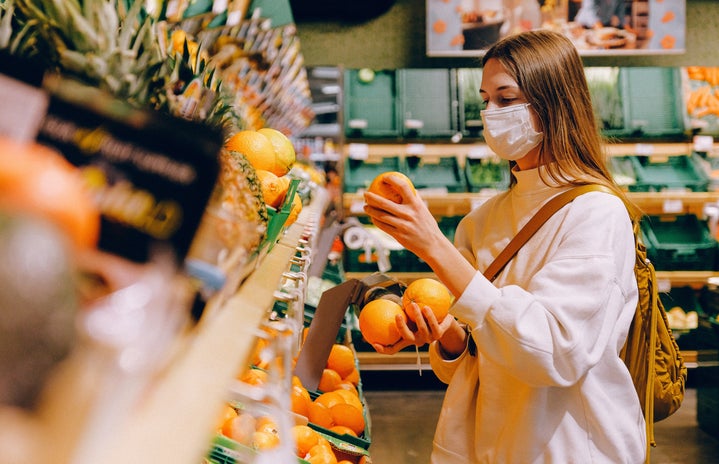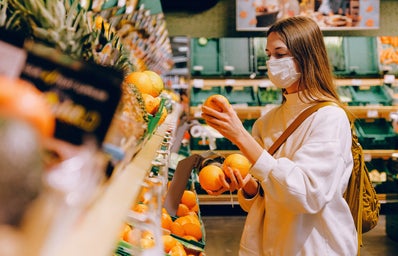In today’s society, conscious consumerism is very counter-cultural. In the era of fast-food, social media, amazon, grocery delivery services, etc, we have all become addicted to America’s efficient economy. Today, speed matters more than quality. However, I argue that this is a very dangerous shift in American perspective. If we only value an item for how fast it can get to us, we forget about how that product was made, or more importantly who made that product.
The history of exploitative farmwork in the U.S. is one that dates farther back than slavery. Millions of migrant farmworkers complete back-breaking work every day to harvest fruits and vegetables, making farm labor one of the most difficult and most underpaid jobs in America. In America, farmworkers are generally paid by piece rather than by hour; an average farm worker earns about $12,000 a year. Many farm workers also face dangerous and exploitative working conditions. It is estimated that 80% of female farmworkers experience sexual harassment in the fields. The unpredictability of poverty that farm workers face makes their situations inescapable, transforming American farming into modern day slavery.

In 1993, a group of hundreds of thousands of immigrant farmworkers in Florida united to form the Coalition of Immokalee Workers (CIW). The CIW’s main goal was to gain protection against sexual violence, forced labor, and other human rights abuses. The CIW progressed into a national campaign to protect and improve the quality of life for all American farmworkers and started the national Campaign for Fair Food in the early 2000s. Today, the Campaign for Fair Foods has won legally-binding agreements with the following multi-billion dollar food retailers: Taco Bell (Yum! Brands), McDonald’s, Burger King, Whole Foods, Subway, Bon Appetit Management Company, Compass Group, Aramark, Sodexo, Trader Joe’s, Chipotle Mexican Grill, Walmart, Fresh Market and Ahold USA. Other food retailing giants, such as Wendy’s, Costco, Kroger and Publix, still refuse to join the campaign.
Nonetheless, supporters of CIW will continue to boycott and pressure these companies into joining the campaign. Thanks to the companies who have already partnered with the Campaign for Fair Food, 10,000 farmworkers from Florida to New Jersey have verifiable human rights protections including: the right to shade and water in the fields, the right to file a complaint without fear of retaliation, the right to work free from sexual harassment and the first real wage increase in over 30 years. Since program’s inception in 2011, there has been 100% direct employment of all workers, $30,000,000+ distributed to workers, enforcement of safety protocols, 250,000 workers educated on their rights, $273,830 in recovered wages, 2,200+ complaints successfully resolved, workers’ hours recorded with verifiable time clocks and zero class action lawsuits. According to Harvard Business Review the fair food program is among the 15 “most important social-impact success stories of the past century.”
I was first introduced to this concept of exploitative and dangerous working conditions for American farm workers this semester when my Theology class discussed CIW’s boycott of Wedny’s. I could not believe that these companies, companies from which I have bought food from and supported blindly my entire life, could consciously support just horrific working conditions just to increase their profit.
While conscious consumerism is not necessarily something that comes to us naturally in today’s society, it is a fairly easy practice to pick up. The first way to encourage yourself to consume consciously is by giving yourself plenty of time to buy something. You cannot wait until the last minute before your purchase if you want to seriously put in some research beforehand. A second helpful tip is to support conscious companies. By using sustainable research engines, such as The Environmental Working Group or Buy Me Once or shopping at places endorsed by worker coalitions, like the food industries listed above, you can make sure to consume consciously. A third helpful tip is to trust certifications from reputable agencies over blanket marketing strategies. Examples of trustworthy certifications are USDA Organic Certified (for food), Made Safe (for personal care and home products), Global Organic Textile Standard (for textiles) and Fair Trade Certified (for food and clothing). Finally, and most importantly, in order to consume consciously we must all shift our spending mindset. It is important to know that the cheapest price is almost always NOT the fair price. It is important to prioritize quality of how it is produced as much, or more, than you prioritize ease.

When shopping, it is important to think of the tangible effect each one of your dollars has. While the efficiency of modern-day shopping may be enticing, it should not lead to sacrificing the quality of workers’ lives. Nor does it have to! Do your research and support sustainable, conscious companies.


